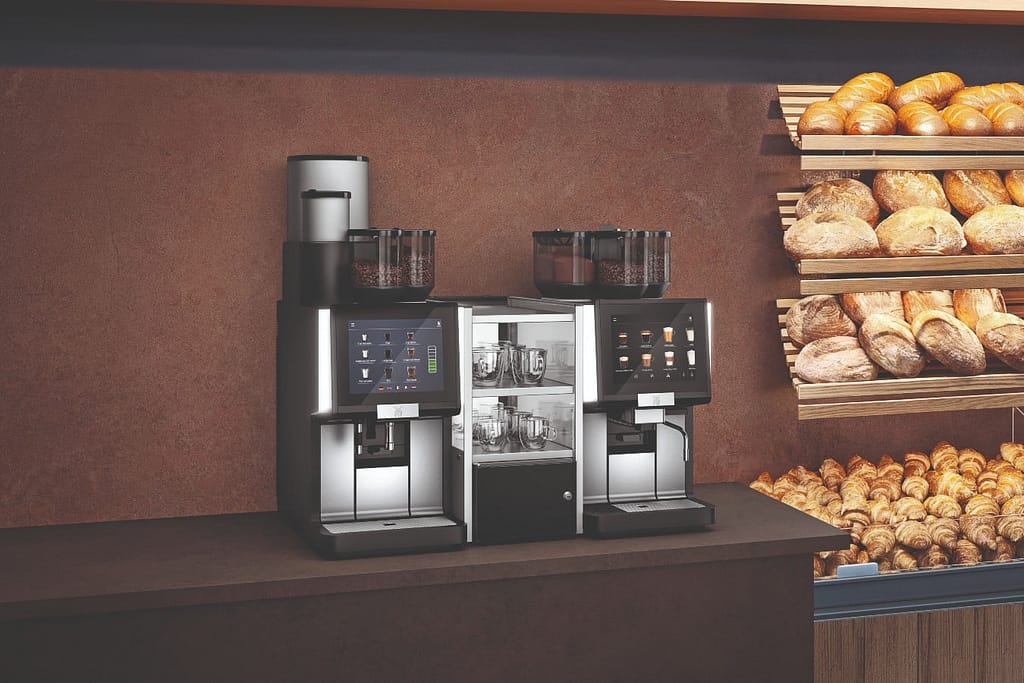WMF deep dives into its new coffee machine, the WMF 1500 F, and explains how it combines speed and automation with consistent high quality of freshly filtered coffee.
For high-volume businesses, finding the right coffee machine to match the required coffee output is crucial. German coffee machine manufacturer WMF is looking to make the decision easier with the release of its latest innovation, the WMF 1500 F automatic coffee machine.
“Freshly filtered coffee is an indispensable part of the beverage menus of modern coffee concepts,” says WMF Professional Coffee Machines Vice President of Strategic Marketing Geoffroy Rupprecht. “To ensure that the popular beverage can be prepared in consistently high quality even at peak times, the new WMF 1500 F fully automatic bean-to-batch machine offers a powerful machine concept.”
“There are many areas where filtered coffee must be prepared quickly and reliably in large quantities, and at a consistently high quality. With the WMF 1500 F, we now have a new solution that precisely meets this requirement and perfectly complements the solution portfolio of WMF Professional Coffee Machines.”
The machine can fully produce fresh filtered coffee in seven seconds, thanks to the integrated four-litre storage urn that can help produce up to 220 cups of coffee per day.
“The optional automatic re-brewing makes for high efficiency during peak periods,” says Rupprecht. “With the help of a user-friendly timer, customers can adapt the required coffee quantity to suit their individual requirements.”
Filtered coffee batches between 0.5 to one litre using the WMF 1500 F can be prepared quickly and reliably in large quantities for high-volume venues including bakeries, petrol stations, breakfast stations, hospitals, nursing homes, offices, hotels, and conferences.
Customers can choose two bean hoppers holding 700 grams and 1100 grams.
The heart of the machine, according to Rupprecht, is its advanced pressure-brew technology, which allows the machine to work with freshly ground beans and brews them in portions.
“When the coffee grinder has completed its grinding process, the portioned ground coffee moves into the brewing chamber.
During the brewing processes, water flows onto the ground coffee at a precise temperature via a distributor sieve, ensuring ideal extraction,” Rupprecht says.
WMF’s telemetry solution, CoffeeConnect, is also featured in the company’s latest machine. As it does with other WMF coffee machines, CoffeeConnect enables the WMF 1500 F to communicate with other systems and devices across the company’s range, including with Enterprise Resource Planning systems via the cloud for pay-per-cup in franchising models.
“The wide portfolio of digital solutions makes it possible to gain insight into machine data, optimise processes, increase the performance of the machine fleet, and open up completely new business models,” says Rupprecht.
Time saving was also a clear priority in the development of the WMF 1500 F, evident by the way the machine disposes of dry coffee grounds.
“[The disposal] takes place via the internal grounds box or optionally through the counter into a larger collection container,” Rupprecht says.
“WMF customers no longer have to deal with the time-consuming but also unpleasant wet grounds disposal, which is still one of the market pain points.”
Rupprecht says the machine’s small footprint and compact design stands out, standing at 32.5 centimeters wide, 88.1 centimeters tall, and 59 centimeters deep.
“Like all WMF fully automatic machines, the WMF 1500 F is a real design eye-catcher and looks perfect in combination with other WMF machines and add-on equipment,” he says.
According to Rupprecht, WMF is putting more of a focus on automation in general, in addition to its WMF AutoClean, Dynamic Milk Assist and Dynamic Coffee Assist features, seeing it as the key to coffee concepts of the future.
“WMF is one of the first manufacturers to actively take up the success-critical importance of automated workflows and data analyses and implement them in new solutions,” he says. “The goal is always to get the best out of practical optimisation potential.”
Among the goals of WMF in the automation space is to make the day-to-day operations of businesses more efficient, transparent, and more attractive in terms of revenue.
In turn, the company believes this will help retain customers and acquire new ones while developing new business models.
“In times of acute staff shortages, cost pressure and rising customer demands, it is crucial for process reliability and efficiency to free staff from repetitive and time-consuming tasks so that they can concentrate on sales and customer service,” says Rupprecht.
WMF has shown in recent years that fully-automated coffee machines can reliably deliver high quality coffee in large quantities.
“The setting parameters on fully automatic machines have improved extremely in recent years and thus ensure a consistently high coffee quality,” Rupprecht says. “For the consistent further development of the WMF premium standard, our professional coffee trainers and coffeeologists work hand in hand with our development engineers.”
Rupprecht believes this rising growth of popularity for automated machines will continue, so long as companies such as WMF look to innovate further with new technologies.
“We see a clear trend towards everything that supports and specifically relieves the on-site workforce, whether in the conceptual area such as self-service or in functional terms with fully automatic machines,” he says.
For more information, visit www.wmf-coffeemachines.com
This article was first published in the November/December 2023 edition of Global Coffee Report. Read more HERE.
The post How WMF combines speed and automation with the WMF 1500 F appeared first on Global Coffee Report.


